Reflective Practice: Ethical Dilemmas in Patient Care - Wound Safety
VerifiedAdded on 2023/06/13
|7
|1888
|399
Essay
AI Summary
This reflective account details an experience during a college placement in a care home, where the author, an assistant caregiver, observed a senior caregiver failing to adhere to hand hygiene protocols before attending to a patient's wound. The account explores the author's feelings of concern and intimidation, the subsequent discussion with a mentor, and the eventual change in the senior caregiver's practice. The reflection emphasizes the importance of infection prevention, the role of uniform cleanliness, and the need for junior healthcare providers to assertively address ethical concerns to ensure patient safety. The author concludes with an action plan to enhance communication skills, adopt disinfectant uniforms, and seek further education on maintaining cleanliness in healthcare settings, ultimately aiming to improve future practice and patient outcomes. Desklib provides access to similar solved assignments and past papers for students.
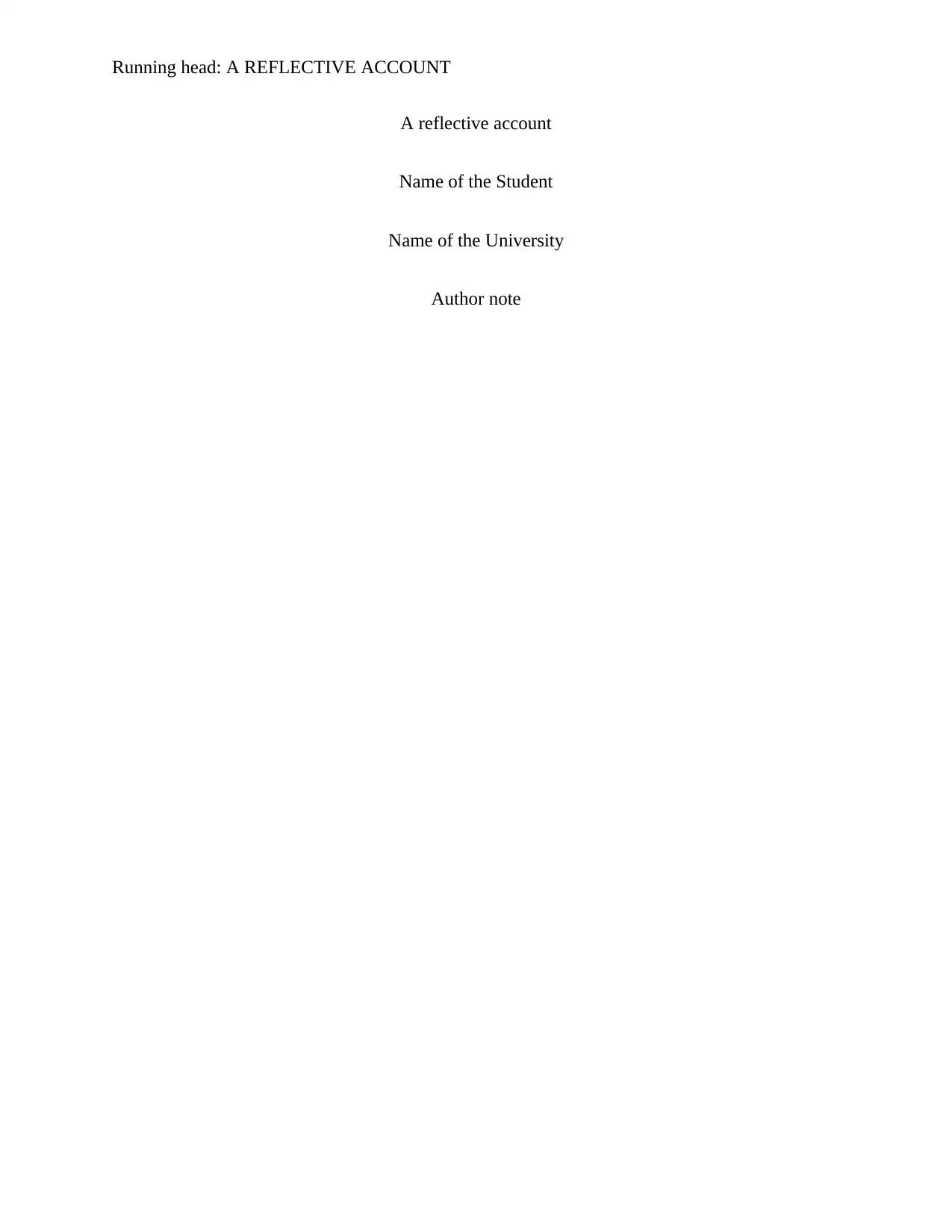
Running head: A REFLECTIVE ACCOUNT
A reflective account
Name of the Student
Name of the University
Author note
A reflective account
Name of the Student
Name of the University
Author note
Paraphrase This Document
Need a fresh take? Get an instant paraphrase of this document with our AI Paraphraser
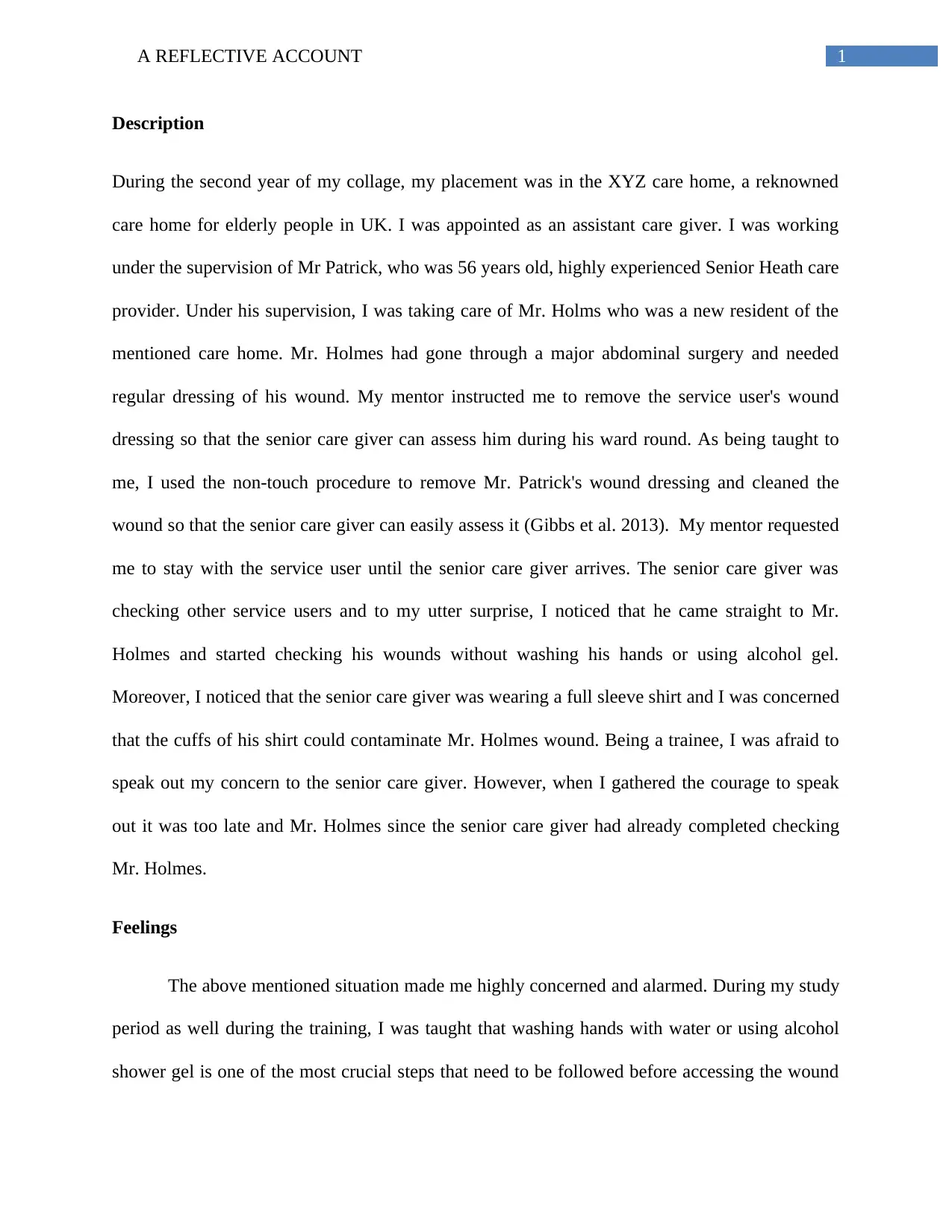
1A REFLECTIVE ACCOUNT
Description
During the second year of my collage, my placement was in the XYZ care home, a reknowned
care home for elderly people in UK. I was appointed as an assistant care giver. I was working
under the supervision of Mr Patrick, who was 56 years old, highly experienced Senior Heath care
provider. Under his supervision, I was taking care of Mr. Holms who was a new resident of the
mentioned care home. Mr. Holmes had gone through a major abdominal surgery and needed
regular dressing of his wound. My mentor instructed me to remove the service user's wound
dressing so that the senior care giver can assess him during his ward round. As being taught to
me, I used the non-touch procedure to remove Mr. Patrick's wound dressing and cleaned the
wound so that the senior care giver can easily assess it (Gibbs et al. 2013). My mentor requested
me to stay with the service user until the senior care giver arrives. The senior care giver was
checking other service users and to my utter surprise, I noticed that he came straight to Mr.
Holmes and started checking his wounds without washing his hands or using alcohol gel.
Moreover, I noticed that the senior care giver was wearing a full sleeve shirt and I was concerned
that the cuffs of his shirt could contaminate Mr. Holmes wound. Being a trainee, I was afraid to
speak out my concern to the senior care giver. However, when I gathered the courage to speak
out it was too late and Mr. Holmes since the senior care giver had already completed checking
Mr. Holmes.
Feelings
The above mentioned situation made me highly concerned and alarmed. During my study
period as well during the training, I was taught that washing hands with water or using alcohol
shower gel is one of the most crucial steps that need to be followed before accessing the wound
Description
During the second year of my collage, my placement was in the XYZ care home, a reknowned
care home for elderly people in UK. I was appointed as an assistant care giver. I was working
under the supervision of Mr Patrick, who was 56 years old, highly experienced Senior Heath care
provider. Under his supervision, I was taking care of Mr. Holms who was a new resident of the
mentioned care home. Mr. Holmes had gone through a major abdominal surgery and needed
regular dressing of his wound. My mentor instructed me to remove the service user's wound
dressing so that the senior care giver can assess him during his ward round. As being taught to
me, I used the non-touch procedure to remove Mr. Patrick's wound dressing and cleaned the
wound so that the senior care giver can easily assess it (Gibbs et al. 2013). My mentor requested
me to stay with the service user until the senior care giver arrives. The senior care giver was
checking other service users and to my utter surprise, I noticed that he came straight to Mr.
Holmes and started checking his wounds without washing his hands or using alcohol gel.
Moreover, I noticed that the senior care giver was wearing a full sleeve shirt and I was concerned
that the cuffs of his shirt could contaminate Mr. Holmes wound. Being a trainee, I was afraid to
speak out my concern to the senior care giver. However, when I gathered the courage to speak
out it was too late and Mr. Holmes since the senior care giver had already completed checking
Mr. Holmes.
Feelings
The above mentioned situation made me highly concerned and alarmed. During my study
period as well during the training, I was taught that washing hands with water or using alcohol
shower gel is one of the most crucial steps that need to be followed before accessing the wound
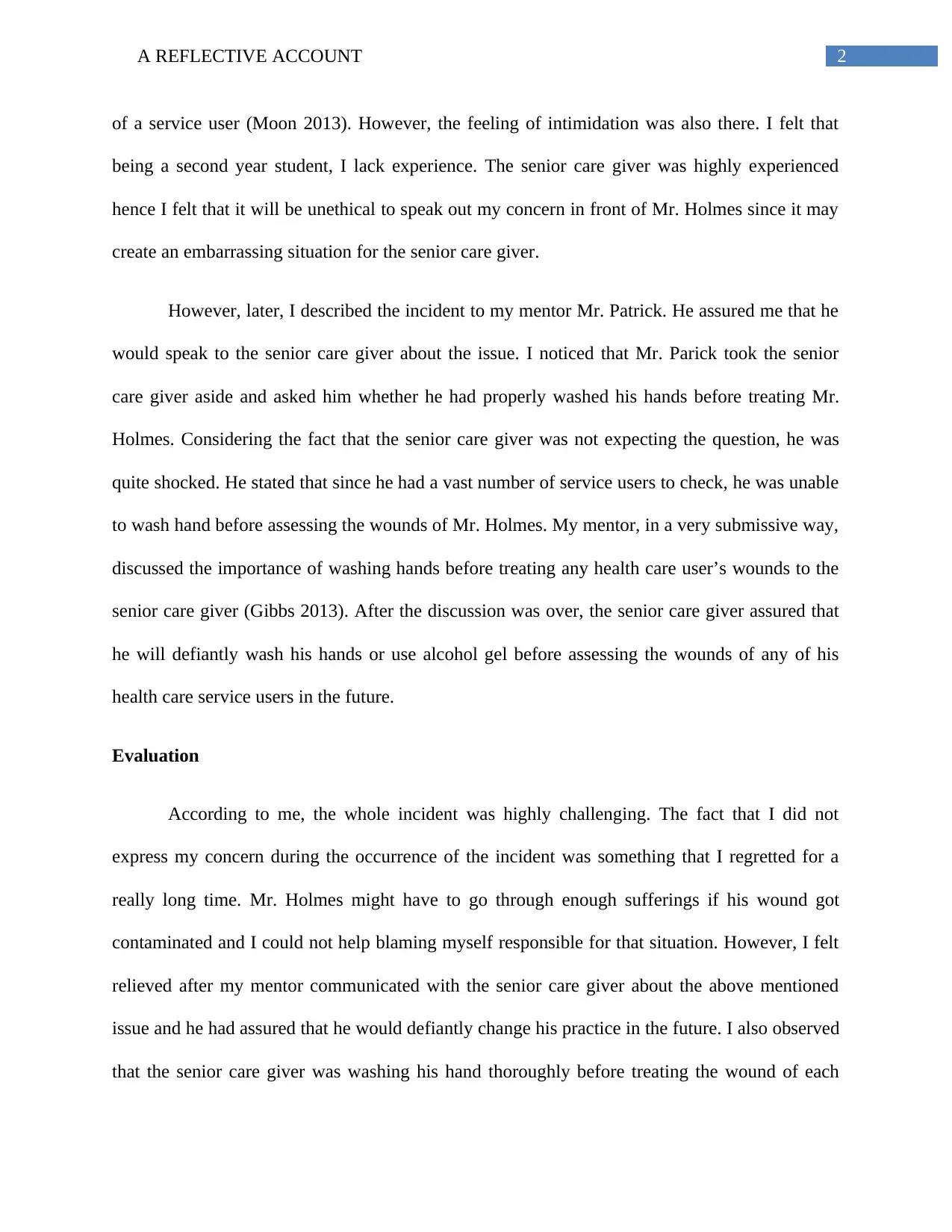
2A REFLECTIVE ACCOUNT
of a service user (Moon 2013). However, the feeling of intimidation was also there. I felt that
being a second year student, I lack experience. The senior care giver was highly experienced
hence I felt that it will be unethical to speak out my concern in front of Mr. Holmes since it may
create an embarrassing situation for the senior care giver.
However, later, I described the incident to my mentor Mr. Patrick. He assured me that he
would speak to the senior care giver about the issue. I noticed that Mr. Parick took the senior
care giver aside and asked him whether he had properly washed his hands before treating Mr.
Holmes. Considering the fact that the senior care giver was not expecting the question, he was
quite shocked. He stated that since he had a vast number of service users to check, he was unable
to wash hand before assessing the wounds of Mr. Holmes. My mentor, in a very submissive way,
discussed the importance of washing hands before treating any health care user’s wounds to the
senior care giver (Gibbs 2013). After the discussion was over, the senior care giver assured that
he will defiantly wash his hands or use alcohol gel before assessing the wounds of any of his
health care service users in the future.
Evaluation
According to me, the whole incident was highly challenging. The fact that I did not
express my concern during the occurrence of the incident was something that I regretted for a
really long time. Mr. Holmes might have to go through enough sufferings if his wound got
contaminated and I could not help blaming myself responsible for that situation. However, I felt
relieved after my mentor communicated with the senior care giver about the above mentioned
issue and he had assured that he would defiantly change his practice in the future. I also observed
that the senior care giver was washing his hand thoroughly before treating the wound of each
of a service user (Moon 2013). However, the feeling of intimidation was also there. I felt that
being a second year student, I lack experience. The senior care giver was highly experienced
hence I felt that it will be unethical to speak out my concern in front of Mr. Holmes since it may
create an embarrassing situation for the senior care giver.
However, later, I described the incident to my mentor Mr. Patrick. He assured me that he
would speak to the senior care giver about the issue. I noticed that Mr. Parick took the senior
care giver aside and asked him whether he had properly washed his hands before treating Mr.
Holmes. Considering the fact that the senior care giver was not expecting the question, he was
quite shocked. He stated that since he had a vast number of service users to check, he was unable
to wash hand before assessing the wounds of Mr. Holmes. My mentor, in a very submissive way,
discussed the importance of washing hands before treating any health care user’s wounds to the
senior care giver (Gibbs 2013). After the discussion was over, the senior care giver assured that
he will defiantly wash his hands or use alcohol gel before assessing the wounds of any of his
health care service users in the future.
Evaluation
According to me, the whole incident was highly challenging. The fact that I did not
express my concern during the occurrence of the incident was something that I regretted for a
really long time. Mr. Holmes might have to go through enough sufferings if his wound got
contaminated and I could not help blaming myself responsible for that situation. However, I felt
relieved after my mentor communicated with the senior care giver about the above mentioned
issue and he had assured that he would defiantly change his practice in the future. I also observed
that the senior care giver was washing his hand thoroughly before treating the wound of each
⊘ This is a preview!⊘
Do you want full access?
Subscribe today to unlock all pages.

Trusted by 1+ million students worldwide
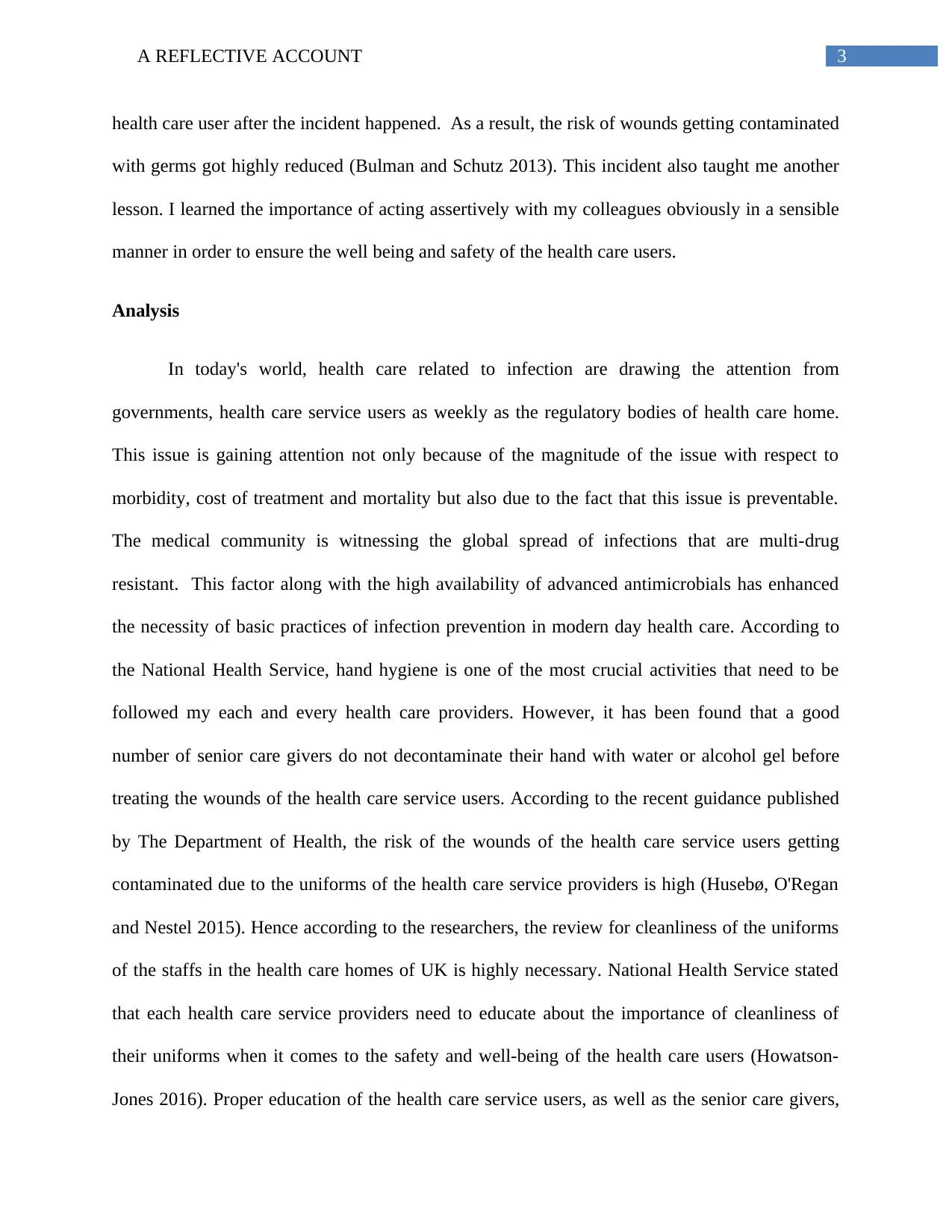
3A REFLECTIVE ACCOUNT
health care user after the incident happened. As a result, the risk of wounds getting contaminated
with germs got highly reduced (Bulman and Schutz 2013). This incident also taught me another
lesson. I learned the importance of acting assertively with my colleagues obviously in a sensible
manner in order to ensure the well being and safety of the health care users.
Analysis
In today's world, health care related to infection are drawing the attention from
governments, health care service users as weekly as the regulatory bodies of health care home.
This issue is gaining attention not only because of the magnitude of the issue with respect to
morbidity, cost of treatment and mortality but also due to the fact that this issue is preventable.
The medical community is witnessing the global spread of infections that are multi-drug
resistant. This factor along with the high availability of advanced antimicrobials has enhanced
the necessity of basic practices of infection prevention in modern day health care. According to
the National Health Service, hand hygiene is one of the most crucial activities that need to be
followed my each and every health care providers. However, it has been found that a good
number of senior care givers do not decontaminate their hand with water or alcohol gel before
treating the wounds of the health care service users. According to the recent guidance published
by The Department of Health, the risk of the wounds of the health care service users getting
contaminated due to the uniforms of the health care service providers is high (Husebø, O'Regan
and Nestel 2015). Hence according to the researchers, the review for cleanliness of the uniforms
of the staffs in the health care homes of UK is highly necessary. National Health Service stated
that each health care service providers need to educate about the importance of cleanliness of
their uniforms when it comes to the safety and well-being of the health care users (Howatson-
Jones 2016). Proper education of the health care service users, as well as the senior care givers,
health care user after the incident happened. As a result, the risk of wounds getting contaminated
with germs got highly reduced (Bulman and Schutz 2013). This incident also taught me another
lesson. I learned the importance of acting assertively with my colleagues obviously in a sensible
manner in order to ensure the well being and safety of the health care users.
Analysis
In today's world, health care related to infection are drawing the attention from
governments, health care service users as weekly as the regulatory bodies of health care home.
This issue is gaining attention not only because of the magnitude of the issue with respect to
morbidity, cost of treatment and mortality but also due to the fact that this issue is preventable.
The medical community is witnessing the global spread of infections that are multi-drug
resistant. This factor along with the high availability of advanced antimicrobials has enhanced
the necessity of basic practices of infection prevention in modern day health care. According to
the National Health Service, hand hygiene is one of the most crucial activities that need to be
followed my each and every health care providers. However, it has been found that a good
number of senior care givers do not decontaminate their hand with water or alcohol gel before
treating the wounds of the health care service users. According to the recent guidance published
by The Department of Health, the risk of the wounds of the health care service users getting
contaminated due to the uniforms of the health care service providers is high (Husebø, O'Regan
and Nestel 2015). Hence according to the researchers, the review for cleanliness of the uniforms
of the staffs in the health care homes of UK is highly necessary. National Health Service stated
that each health care service providers need to educate about the importance of cleanliness of
their uniforms when it comes to the safety and well-being of the health care users (Howatson-
Jones 2016). Proper education of the health care service users, as well as the senior care givers,
Paraphrase This Document
Need a fresh take? Get an instant paraphrase of this document with our AI Paraphraser
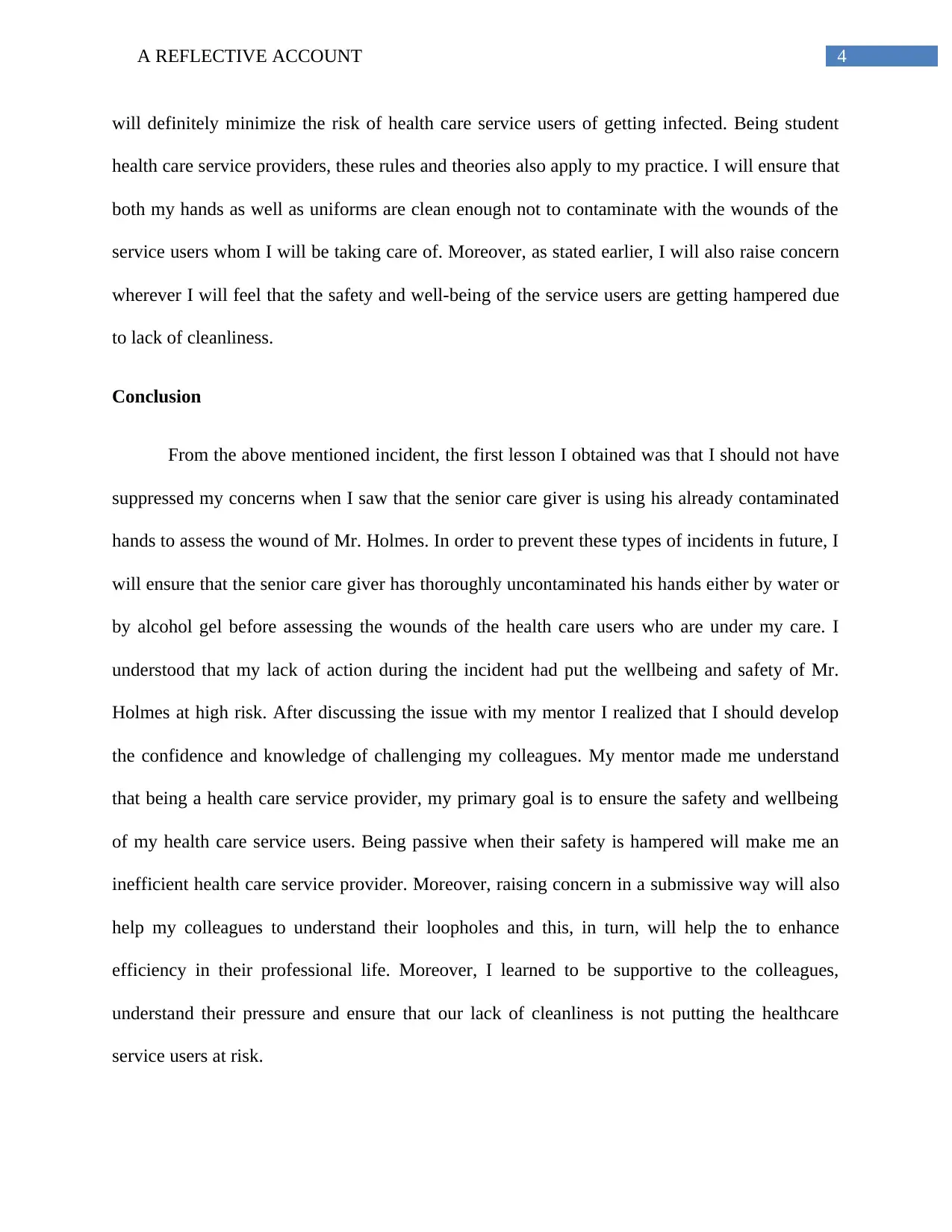
4A REFLECTIVE ACCOUNT
will definitely minimize the risk of health care service users of getting infected. Being student
health care service providers, these rules and theories also apply to my practice. I will ensure that
both my hands as well as uniforms are clean enough not to contaminate with the wounds of the
service users whom I will be taking care of. Moreover, as stated earlier, I will also raise concern
wherever I will feel that the safety and well-being of the service users are getting hampered due
to lack of cleanliness.
Conclusion
From the above mentioned incident, the first lesson I obtained was that I should not have
suppressed my concerns when I saw that the senior care giver is using his already contaminated
hands to assess the wound of Mr. Holmes. In order to prevent these types of incidents in future, I
will ensure that the senior care giver has thoroughly uncontaminated his hands either by water or
by alcohol gel before assessing the wounds of the health care users who are under my care. I
understood that my lack of action during the incident had put the wellbeing and safety of Mr.
Holmes at high risk. After discussing the issue with my mentor I realized that I should develop
the confidence and knowledge of challenging my colleagues. My mentor made me understand
that being a health care service provider, my primary goal is to ensure the safety and wellbeing
of my health care service users. Being passive when their safety is hampered will make me an
inefficient health care service provider. Moreover, raising concern in a submissive way will also
help my colleagues to understand their loopholes and this, in turn, will help the to enhance
efficiency in their professional life. Moreover, I learned to be supportive to the colleagues,
understand their pressure and ensure that our lack of cleanliness is not putting the healthcare
service users at risk.
will definitely minimize the risk of health care service users of getting infected. Being student
health care service providers, these rules and theories also apply to my practice. I will ensure that
both my hands as well as uniforms are clean enough not to contaminate with the wounds of the
service users whom I will be taking care of. Moreover, as stated earlier, I will also raise concern
wherever I will feel that the safety and well-being of the service users are getting hampered due
to lack of cleanliness.
Conclusion
From the above mentioned incident, the first lesson I obtained was that I should not have
suppressed my concerns when I saw that the senior care giver is using his already contaminated
hands to assess the wound of Mr. Holmes. In order to prevent these types of incidents in future, I
will ensure that the senior care giver has thoroughly uncontaminated his hands either by water or
by alcohol gel before assessing the wounds of the health care users who are under my care. I
understood that my lack of action during the incident had put the wellbeing and safety of Mr.
Holmes at high risk. After discussing the issue with my mentor I realized that I should develop
the confidence and knowledge of challenging my colleagues. My mentor made me understand
that being a health care service provider, my primary goal is to ensure the safety and wellbeing
of my health care service users. Being passive when their safety is hampered will make me an
inefficient health care service provider. Moreover, raising concern in a submissive way will also
help my colleagues to understand their loopholes and this, in turn, will help the to enhance
efficiency in their professional life. Moreover, I learned to be supportive to the colleagues,
understand their pressure and ensure that our lack of cleanliness is not putting the healthcare
service users at risk.
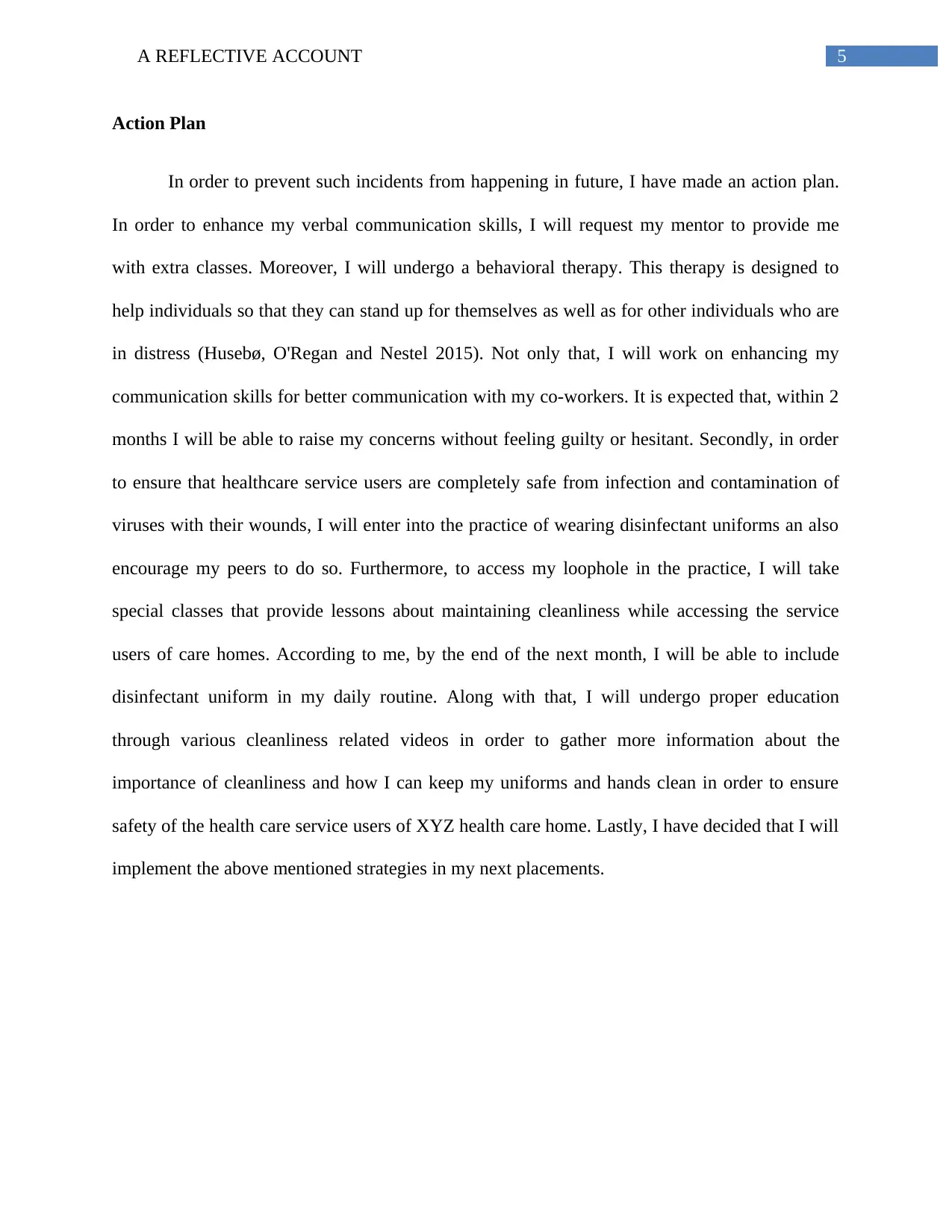
5A REFLECTIVE ACCOUNT
Action Plan
In order to prevent such incidents from happening in future, I have made an action plan.
In order to enhance my verbal communication skills, I will request my mentor to provide me
with extra classes. Moreover, I will undergo a behavioral therapy. This therapy is designed to
help individuals so that they can stand up for themselves as well as for other individuals who are
in distress (Husebø, O'Regan and Nestel 2015). Not only that, I will work on enhancing my
communication skills for better communication with my co-workers. It is expected that, within 2
months I will be able to raise my concerns without feeling guilty or hesitant. Secondly, in order
to ensure that healthcare service users are completely safe from infection and contamination of
viruses with their wounds, I will enter into the practice of wearing disinfectant uniforms an also
encourage my peers to do so. Furthermore, to access my loophole in the practice, I will take
special classes that provide lessons about maintaining cleanliness while accessing the service
users of care homes. According to me, by the end of the next month, I will be able to include
disinfectant uniform in my daily routine. Along with that, I will undergo proper education
through various cleanliness related videos in order to gather more information about the
importance of cleanliness and how I can keep my uniforms and hands clean in order to ensure
safety of the health care service users of XYZ health care home. Lastly, I have decided that I will
implement the above mentioned strategies in my next placements.
Action Plan
In order to prevent such incidents from happening in future, I have made an action plan.
In order to enhance my verbal communication skills, I will request my mentor to provide me
with extra classes. Moreover, I will undergo a behavioral therapy. This therapy is designed to
help individuals so that they can stand up for themselves as well as for other individuals who are
in distress (Husebø, O'Regan and Nestel 2015). Not only that, I will work on enhancing my
communication skills for better communication with my co-workers. It is expected that, within 2
months I will be able to raise my concerns without feeling guilty or hesitant. Secondly, in order
to ensure that healthcare service users are completely safe from infection and contamination of
viruses with their wounds, I will enter into the practice of wearing disinfectant uniforms an also
encourage my peers to do so. Furthermore, to access my loophole in the practice, I will take
special classes that provide lessons about maintaining cleanliness while accessing the service
users of care homes. According to me, by the end of the next month, I will be able to include
disinfectant uniform in my daily routine. Along with that, I will undergo proper education
through various cleanliness related videos in order to gather more information about the
importance of cleanliness and how I can keep my uniforms and hands clean in order to ensure
safety of the health care service users of XYZ health care home. Lastly, I have decided that I will
implement the above mentioned strategies in my next placements.
⊘ This is a preview!⊘
Do you want full access?
Subscribe today to unlock all pages.

Trusted by 1+ million students worldwide
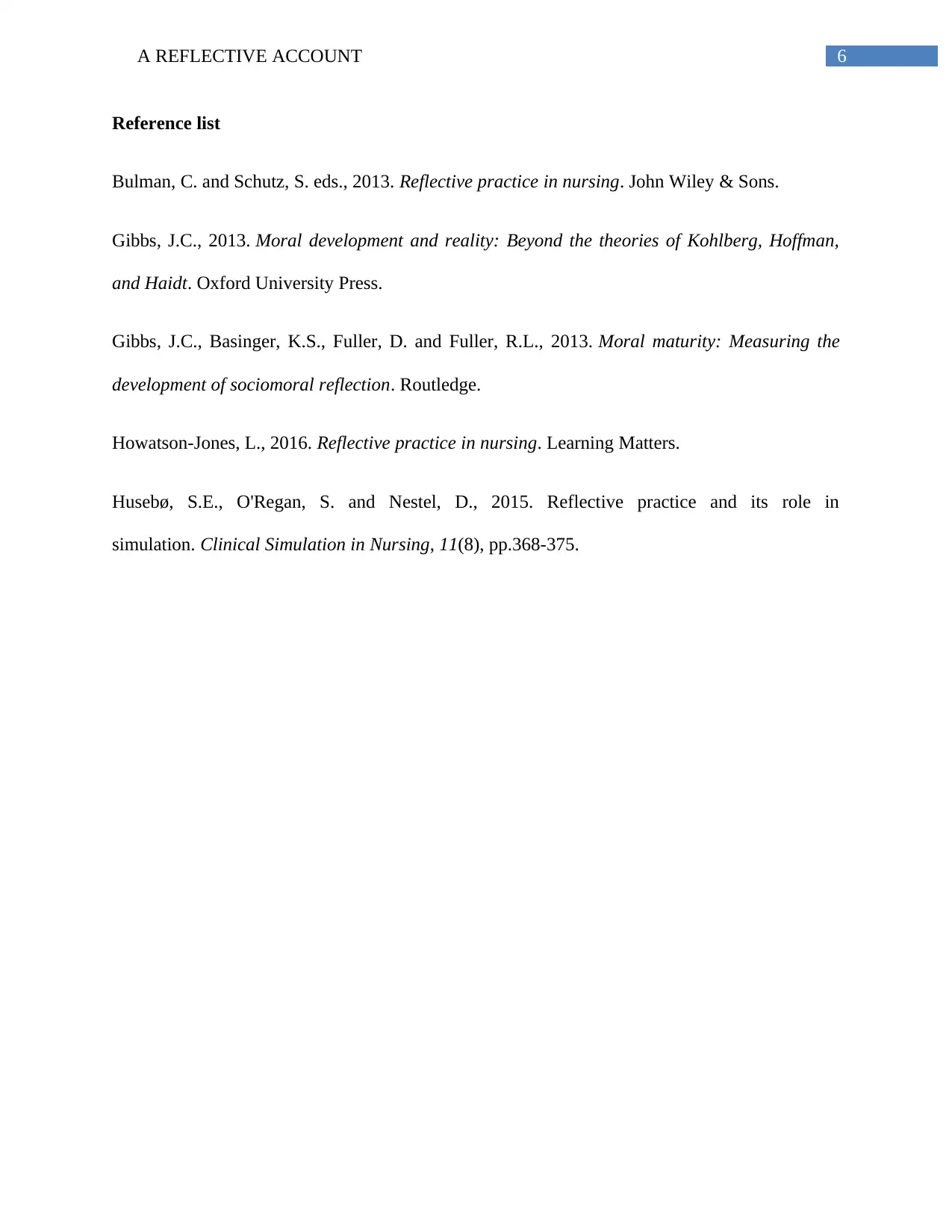
6A REFLECTIVE ACCOUNT
Reference list
Bulman, C. and Schutz, S. eds., 2013. Reflective practice in nursing. John Wiley & Sons.
Gibbs, J.C., 2013. Moral development and reality: Beyond the theories of Kohlberg, Hoffman,
and Haidt. Oxford University Press.
Gibbs, J.C., Basinger, K.S., Fuller, D. and Fuller, R.L., 2013. Moral maturity: Measuring the
development of sociomoral reflection. Routledge.
Howatson-Jones, L., 2016. Reflective practice in nursing. Learning Matters.
Husebø, S.E., O'Regan, S. and Nestel, D., 2015. Reflective practice and its role in
simulation. Clinical Simulation in Nursing, 11(8), pp.368-375.
Reference list
Bulman, C. and Schutz, S. eds., 2013. Reflective practice in nursing. John Wiley & Sons.
Gibbs, J.C., 2013. Moral development and reality: Beyond the theories of Kohlberg, Hoffman,
and Haidt. Oxford University Press.
Gibbs, J.C., Basinger, K.S., Fuller, D. and Fuller, R.L., 2013. Moral maturity: Measuring the
development of sociomoral reflection. Routledge.
Howatson-Jones, L., 2016. Reflective practice in nursing. Learning Matters.
Husebø, S.E., O'Regan, S. and Nestel, D., 2015. Reflective practice and its role in
simulation. Clinical Simulation in Nursing, 11(8), pp.368-375.
1 out of 7
Related Documents
Your All-in-One AI-Powered Toolkit for Academic Success.
+13062052269
info@desklib.com
Available 24*7 on WhatsApp / Email
![[object Object]](/_next/static/media/star-bottom.7253800d.svg)
Unlock your academic potential
Copyright © 2020–2026 A2Z Services. All Rights Reserved. Developed and managed by ZUCOL.





